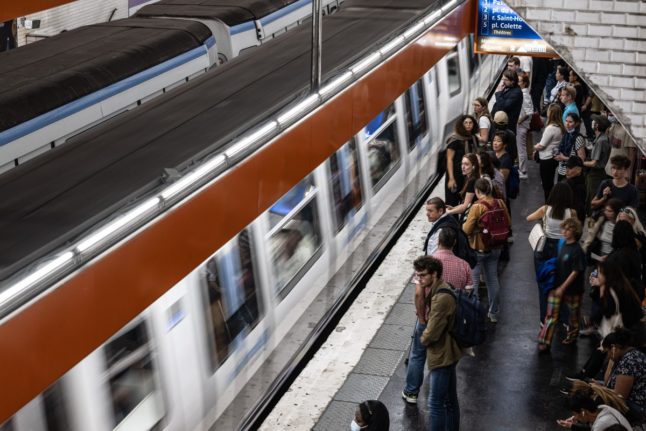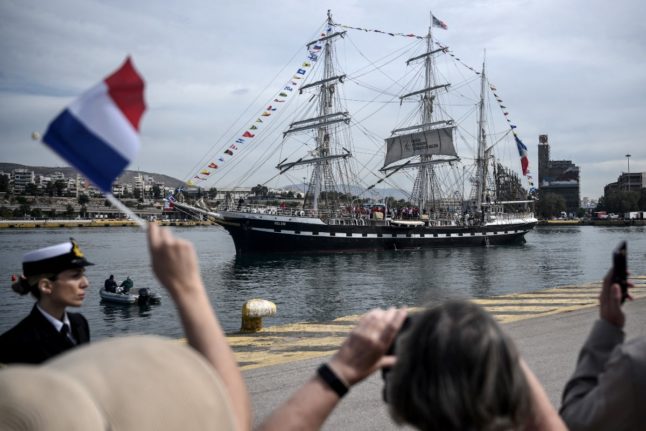Ticket prices for Paris Metros, buses and RER trains are set to almost double during the 2024 Olympic Games and Paralympics, while a single ticket from the city centre to either the Roissy Charles de Gaulle or Orly airports will increase by €5 to a whopping €16, during the Games’ period.
Paris expects to welcome 15 million visitors during the Olympics and Paralympics, and is preparing to offer increased public transportation options during the Games compared to standard periods.
And that means extra costs – and regional president Valérie Pécresse has said residents of Île-de-France will not be asked to foot the bill.
Hence the temporary price increases – which are expected to run from July 20th to September 8th, whilst Olympic visitors are in town.
As such, Ile-de-France Mobilités (IDFM) are advising residents who only use the region’s public transport sporadically to “purchase transport tickets before July 20th”. On top of saving money, you would also save time, as long queues during the Olympic period can be expected.
Which tickets are going up?
Starting on July 20th, a single metro ticket will almost double and will increase to €4 from July 20 to September 8, 2024, in contrast to the €2.15 it cost as of January 2024.
A carnet – or bundle of 10 tickets will cost €32, compared to €17.30.
During the Olympic period, the usual daily and weekly passes will no longer be available for purchase. They will be replaced by a special ‘Paris 2024’ pass which will allow travel throughout the region (all zones), as well as to and from airports.
The price breakdown will be: €16 for 1 day, €30 for 2 days, €42 for 3 days and €70 for the week with the ‘Paris 2024’ pass.
As for monthly and yearly passes – those are not increasing in price. Special cards – like the Imagin’R and senior passes will not be affected by price increases.
Similarly, the ‘Liberté +’ pay-as-you-go card will still be available at usual pricing.
Here are some ways residents can avoid paying extra on transport during the Olympics:
Set up a Liberté + plan
This pass allows you to pay for individual journeys as you go, while benefitting from a reduced rate of €1.73 instead of €2.15 for a classic T+ ticket.
If you take several journeys in one day, you are billed a maximum of €8.65 (the cost of a 2-zone day pass) and the rest of your journeys are free.
During the Olympics, Que Choisir reported that the Liberté + plan would stay the same.
In order to sign up, you have to subscribe online and connect the account to your RIB. You can also track your consumption online, and at the end of the month you pay the total amount that you travelled.
If you plan on extra trips, you can also load a Navigo weekly or monthly pass onto the card by going online.
Keep in mind that the Liberté + only works inside of Paris proper (zone 1), though you can use it to get to and from the airport.
Buy single-use tickets before July 20th
With single journey tickets going up in price, one technique would be to stock up prior to the start of the Olympic period (July 20).
There are two ways to do this; purchase several paper tickets ahead of time, or fill up a ‘Navigo easy’ card.
While it is no longer possible to buy a bundle (carnet) of 10 paper tickets at the reduced price, you can still do so with the rechargeable Navigo Easy card.
If you have an android you can download the ticketing app and purchase tickets ahead of time as well. Unfortunately, the service is not yet available for iPhones. More info here.
Keep in mind that these tickets are meant to be used inside of Paris (zone 1), so if you are going to the suburbs this may not be the best option for you.
Buy a monthly pass
Thankfully monthly Navigo cards – which offer unlimited transport journeys from the first day of a month until the last – will remain at their normal rates.
If you are a regular Metro, bus, tram or RER user who typically does not buy monthly passes, it might be worth doing so for the Olympics. That being said, keep in mind that it may not be wise to purchase the monthly pass in mid-July, as you’d only benefit from a few days.
This option would probably be best for those planning to travel a lot during the entire month of August. It is also advantageous as it allows for travel within multiple zones. They are also ‘dezoned’ between mid-July and mid-August, as well as on weekends, public holidays, and the school holidays.
In 2024, monthly rates went up to €86.40 for an all-zones pass. Even with the increased pricing for the 2024 monthly passes, if you plan on taking more than 21 journeys on public transport in August, then you would save money by purchasing the Navigo monthly pass versus buying single-use tickets during the Games.
Prices will return to normal levels on September 8th after the Paralympics have ended, and you are not obligated to renew the monthly pass.
READ ALSO Factcheck: Will you really need a QR code to walk around Paris during the Olympics?
Which option should I go for?
This depends on how often you plan on using the public transport system. The benefit to the Liberté + option is that you can pay as you go, but it does take some coordination ahead of time (setting up the account) and it is mainly intended for people staying within Paris proper.
As for the Navigo monthly pass, it only covers that specific month in question, so you would not be able to buy one lasting 30-days from mid-July to mid-August for instance.
Ultimately, if you are choosing between purchasing several carnets (at €17.30 each) versus buying a pass, ask yourself if you expect to take more than 50 journeys using the Metro system (including buses, trams, and the RER) during the month of August.
You can buy five carnets for €86.50 and get 50 individual journeys, while for about the same price you can get unlimited journeys for the whole month with the monthly pass.
Before deciding, you should sit down and think about how many journeys you would reasonably take between July 20th and September 8th, considering that this is the summer holiday period and you may be out of town for a portion of the Olympic period.



 Please whitelist us to continue reading.
Please whitelist us to continue reading.
Member comments